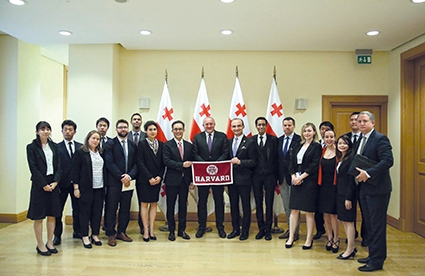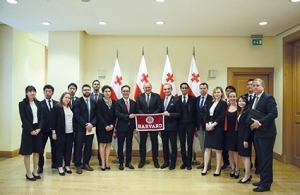The Eurasia Leadership Trek
This week, Georgia hosted a group of young leaders from Harvard, MIT, and Tufts universities in the United States. They were part of the Eurasia Leadership Trek (ELT) 2018, under the auspices of the Center for Asia Leadership Initiatives. ELT is a socioeconomic and political study tour and public service program that covers five countries in the wider Black Sea region – Georgia, Azerbaijan, Turkey, Ukraine, and Moldova. While in Georgia, Trekkers met with Georgian President Giorgi Margvelashvili, Chairman of the Parliament Irakli Kobakhidze, officials from the Foreign and Defense ministries, and members of the academic community. Participants also held discussions with senior country representatives of NATO, the EU and UNDP, including civil society and private sector leaders, such as the Rondeli Foundation (GFSIS), the National Democratic Institute (NDI) and TBC Bank.
Leadership Treks aim to provide first-hand insights through an experiential journey, in which participants directly explore political, economic, and societal issues through engagement with leaders and organizations in the field. The theme for this year’s ELT is ‘Understanding Geopolitical Dimensions and Regional Outlook.’ This includes the topics of democratic reforms, regional security, EU and NATO integration, and the economic development of the wider Black Sea region countries.
The Center for Asia Leadership Initiatives, co-founded and headed by Samuel Hungsoo Kim, organizes several such Treks each year. The Center has worked in 76 cities in 34 countries, and aims to be active in all 51 countries in the United Nation’s Asia geoscheme. Previous Treks have mainly covered countries in the Asia-Pacific and Southeast Asia. This is the first year Georgia has been a Trek destination, yet Kim says he is already excited about possibilities for further cooperation in the country.
At Kim’s right in hand is Zviad Adzinbaia, a recent graduate of the Fletcher School for Law and Diplomacy at Tufts, returning to his native Georgia as a Trekker, organizer, guide, and program facilitator. Adzinbaia says he is proud to bring such a program home after his time abroad, and to build connections between Georgian and international leaders.
The Trekkers packed in as many learning opportunities as possible on their short visit to Georgia, visiting the occupation line in Odzisi, and attending the Krynica Economic Forum. They met with students and faculty at Tbilisi State University to share insights and lessons on leadership and listen to students’ perception of Georgia’s future direction and their place in it.
Participants also took advantage of the 100th anniversary of Georgia’s declaration of independence, arriving on May 26 and spending their first day soaking up the celebration. Another taste of Georgian culture came with a visit to Kakheti, where they were treated to a folk performance alongside meetings with government officials and local civil society organizations in Gurjaani, Telavi, and Sighnaghi.
The participants came from top universities in the United States, but represent 12 nations, and with their unique backgrounds bring a diverse array of experiences and perceptions. Before the Trek, they invested significant time in training and mastering workshops, preparing to absorb every aspect of their immersive learning experience, and to conduct conferences and seminars while abroad.
As a leadership program, participants benefit from meeting with high level officials and business leaders, both with the goal of learning from them, and identifying areas for potential partnerships with local leaders, and areas for growth and development on both sides.
One of the most exciting aspects of the program is the element of service to local communities. Trekkers focus on capacity building through mentorship, inspirational stories, discussions on best practices, and capacity building workshops. As part of an ongoing series, the Trek will culminate with a publication titled Rethinking Eurasia, chronicling the experiences, learned best practices, reflections, and insights of participants.
Kim has a bold vision for the Center for Asia Leadership, and has established an expansive integrated regional network with leaders and organizations across 58 cities in 22 countries. The Center’s Asian headquarters are in Kuala Lumpur, Malaysia, but as the program expands westward, the possibility of a Eurasian office in Tbilisi is being floated. Attracted by the politically neutral location and exciting, fast-paced economic development, Kim likens Georgia’s growth potential to his home country of South Korea, which rose from abject poverty after the Korean War to a developed, high-income economy in just one generation. He urges Georgia to embrace its place in Asia, and to seek more partnerships with Asian companies and governments. Words of advice for Georgian leaders – “don’t be overwhelmed by the challenge in front of you,” don’t let opportunities for impact pass you by, do whatever piece you can.
Kim brings a unique optimism and energy to his projects and sees himself as an enabler. In his leadership philosophy, strong leaders need mentors and sponsors on their way up the ladder. He says he found sponsors as he grew from humble beginnings in a missionary family to the United Nations, Harvard, and beyond, and now he wants to sponsor other young leaders. On these Treks, Kim is looking for people with shared values and passion. His ultimate goal, he says, is to “improve the human condition,” and Georgia is an important destination on that journey.
By Samantha Guthrie












